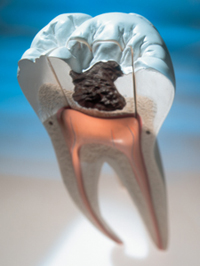Gum Treatment

Diagnosed in its early stages, gum disease is easily treatable and reversible.
At Wallan Dental, we offer services to help treat and improve the health of your gums and overall health.
Gingivitis Treatment: At the early stage of gum disease, gums may be sore or bleed easily and no bone loss is present. This stage is reversible through good oral hygiene and regular professional cleanings from your dentist.
Periodontitis Treatment: The advanced stage of gum disease involves the loss of bone along with swollen and bleeding gums. Periodontitis is irreversible, but disease progression can be stopped or slowed down through proper oral hygiene and regular deep cleaning from a dentist.
Once optimum gum health is achieved, a six-month gum maintenance visit at the dentist is recommended.
How Gum Disease Happens
Gum disease, also known as periodontal disease, refers to bacterial growth and release of harmful factors that destroy the supporting tissue around teeth.
Gum disease starts with the formation of plaque around the teeth which has to be removed on a daily basis. Regular brushing and flossing are often sufficient to get rid of plaque. If plaque is not removed regularly, it turns into tartar (calculus), which is the breeding ground for gum disease-causing bacteria.
These bacteria attack the gums and bone around the teeth, making them loose. Eventually, teeth can fall out due to lack of proper bone support around them.
Dangers of Gum Disease
The relation between gum disease and poor overall health is well documented. Oral bacteria can easily enter the bloodstream through minor toothbrush injuries to gums and travel throughout the body.
- Studies have found that people with gum disease are at twice the risk of heart disease. Bacteria gets mixed up with blood-clotting cells called platelets and forms clumps. These clumps travel in the bloodstream and reach heart vessels where they cause heart-stopping blood clots.
- Infective endocarditis, a potentially fatal disease that involves inflammation of the inner lining of the heart.
- Lung infections in people with chronic lung disease.
- Studies have shown that diabetics with gum disease were three times more likely to have heart attacks than those without gum disease.
- Studies have also found that women with gum disease are seven to eight times more likely to give premature birth to low birth-weight babies.
To take control of your gum health, contact us and let’s schedule a consultation to discuss how we can help you!
Any surgical or invasive procedure carries risks. Before proceeding, you should seek a second opinion from an appropriately qualified health practitioner.
